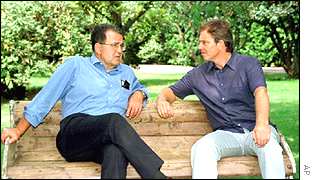| You are in: Europe | |||||||||||||||||||||||||||||||||||||||||||||||||||||||||||||||||||||||||||||||||||||||||||||||||||||||||||||||||||||||||||||||||||||||||||||||||||||||||||||||||||||||||||||||||||||||||||||||||
|
Wednesday, 2 January, 2002, 20:33 GMT
Analysis: What next after euro?

Romano Prodi wants closer integration
By Chris Morris, BBC Europe correspondent
So far so good. After just two days, the world's newest currency seems to be leading a charmed life. Forecasts of chaos have proved largely unfounded, as the euro begins to find its way into wallets and pockets across the continent. There have been long queues, and some technical hiccups. There are people who would still prefer to keep their old national currencies, and others who fear that unscrupulous businesses may try to push through hidden price rises in the initial confusion of the currency change. But all in all, things have gone as well as anyone dared hope. "I am extremely satisfied," said Pedro Solbes, the European Monetary Affairs Commissioner. Future Thoughts are already turning to what might come next. Critics will pounce on any sign of weakness, but if the euro continues to flourish it could well give a boost to plans for further integration in the European Union. Certainly those who favour closer political union hope a successful euro will influence the big constitutional debate about the future of Europe, which the EU has agreed to have over the next couple of years.
It is a sensitive issue. At the moment, meetings of the "euro group" of finance ministers from within euroland are officially "informal". They do not want to give the non-euro countries - Britain, Denmark and Sweden - the impression that they are being left out or exiled to a second tier.
But over time there is bound to be movement in that direction. The President of the European Commission Romano Prodi has already called for "more common rules" and closer co-ordination of economic policy. So it will be difficult for Britain and the others to sit on the fence indefinitely. Either they join the euro, and influence European economic and political policy from the centre. Or perhaps - over a period of years - they drift out to a more semi-detached position, after deciding that there are more advantages in sticking with their national currencies. Defence and foreign affairs In other words, there are huge political issues at stake. But while enthusiasts hope the euro really will foster a much greater sense of common identity, it is not the only expression of power in the EU. As the launch of the common currency approached, it was noticeable that Britain was busy in the fields of diplomacy and defence.
In particular, Britain has demonstrated that it has the kind of military reach and flexibility that the EU wants, especially when it comes to peacekeeping and conflict prevention. It is something that most European countries can only dream about. So there are other ways to exert influence within the EU. But the euro is now a fact on the ground. Both symbolically, and in hard political terms, the new currency is at the centre of the European project, wherever it may lead.
|
See also:
02 Jan 02 | UK Politics
12 Nov 01 | Business
15 Nov 01 | UK Politics
18 Dec 01 | Business
Internet links:
The BBC is not responsible for the content of external internet sites Top Europe stories now:
Links to more Europe stories are at the foot of the page.
|
|||||||||||||||||||||||||||||||||||||||||||||||||||||||||||||||||||||||||||||||||||||||||||||||||||||||||||||||||||||||||||||||||||||||||||||||||||||||||||||||||||||||||||||||||||||||||||||||
|
Links to more Europe stories |
 |
||
| ----------------------------------------------------------------------------------
To BBC Sport>> | To BBC Weather>> | To BBC World Service>> ---------------------------------------------------------------------------------- © MMIII | News Sources | Privacy |